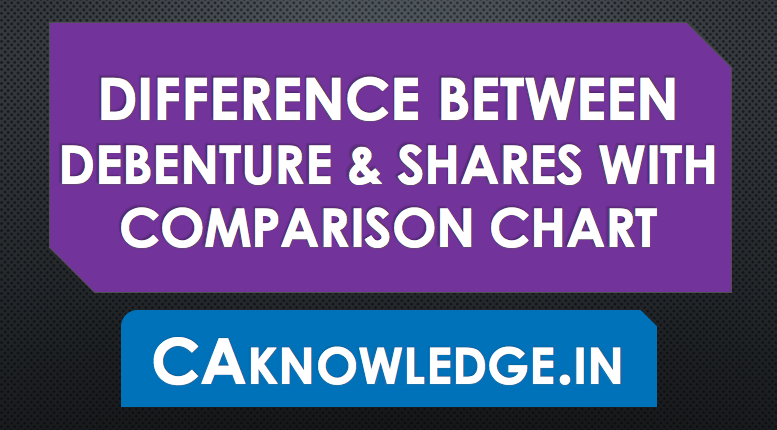Difference Between Debenture & Share: Know the key difference between Share & Debentures. Total shares capital of a company is divided into a number of small invisible units of a fixed amount called a share. Fixed value of a share, printed on the share certificate, is called nominal value/par value/face value. The liability of holder of shares is limited to issue price of shares’ acquired by him.
Meaning – A share is one unit into which the total share capital is divided. Share capital of the company can be explained as a fund or sum with which a company is formed to carry on the business and which is raised by the issue of shares
Definition – The capital of a company is divided into parts, called shares. The shares are said to be movable property and, subject to certain conditions, freely transferable, so that no shareholder is permanently or necessarily wedded to a company.
Definition of Debentures
Meaning – A debenture is an instrument issued by a company under its common seal as acknowledgment of a debt. It contains a contract for repayment of the principal amount on or before a specified date and for payment of interest at a fixed rate until the principal sum is repaid.
“Debenture” includes debenture stock, bonds or any other instrument of a company evidencing a debt, whether constituting a charge on the assets of the company or not; It is evident from the definition that the term debentures covers both secured and unsecured debentures.
Debentures are generally classified into different categories on the basis of:
- (1) convertibility of the instrument
- (2) Security of the Instrument,
- (3) Redemption ability
- (4) Registration of Instrument
| Debenture | Share |
| Debentures constitute a loan. | Shares are part of the capital of a company. |
| Debenture holders are the creditors of the company | Shareholders are the owners of the company |
| Debenture holders have no voting right | Shareholders have voting rights and hence control the total affairs of the company |
| Debenture interest is paid at a predetermined fixed rate. It is payable whether there is any profit or not. | Dividend on shares is payable at a variable rate which is mainly affected by the profitability of the company. |
| Interest on debentures is a charge on the profits of the company and hence deductible as an expense under income tax | Dividends is the appropriation of the profits of the company hence are not deductible as an expense under income tax |
| In balance sheet, debentures are shown under secured loans | In balance sheet, shares are shown under share capital |
| Debenture can be converted into shares as per the terms of issue | Shares cannot be converted into debentures under any circumstances |
| Debentures cannot be forfeited for non payment of calls money | Shares can be forfeited for non payment of allotment and call money |
| At the time of liquidation, debenture holders are paid off before the shareholders | At the time of liquidation, shareholders are paid at the last after debenture holders, creditors, etc |
| Debenture can be issued at a discount, no such restriction in companies act, 2013 | Shares cannot be issued at a discount as per companies act, 2013 |
| Maximum Underwriting commission on Debentures can be 2.5% of Issue price as per companies Act, 2013 or As authorised by Articles whichever is less. | Maximum Underwriting commission on Shares can be 5% of Issue price as per Companies Act, 2013 or As authorised by Articles whichever is less. |
| Return of allotment is not required for allotment of debentures. | Return of allotment in e-Form No. 2 is to be filed for allotment of shares. |
| Interest paid on debenture is a business expenditure and allowable deduction from profits. | Dividend is not allowable deduction as business expenditure. |
Other Relevant Articles
- Difference Between Convertible and Non Convertible Debentures
- Difference Between AGM and EGM, Key Difference Between EGM & AGM
- What should you choose for your startup – LLP or Pvt Ltd ?
- Difference between Public & Private Companies, Pvt Ltd and Public Ltd
- Difference between trading account and demat account
- Difference between shares and stocks with Introduction
- ADR and GDR Complete Guide, Difference Between ADR and GDR
- Difference Between LLP and Partnership with Comparison Chart
- Reverse Mortgage – Features, Meaning, Eligibility, Taxation
- Difference between Mortgage and Charge with Comparison Chart
- Difference Between Executive Director and Independent Director
- Difference Between ESOP and Sweat Equity Shares with Chart
If you have any query regarding “Difference Between Debenture & Shares” then please tell us via below comment box…
